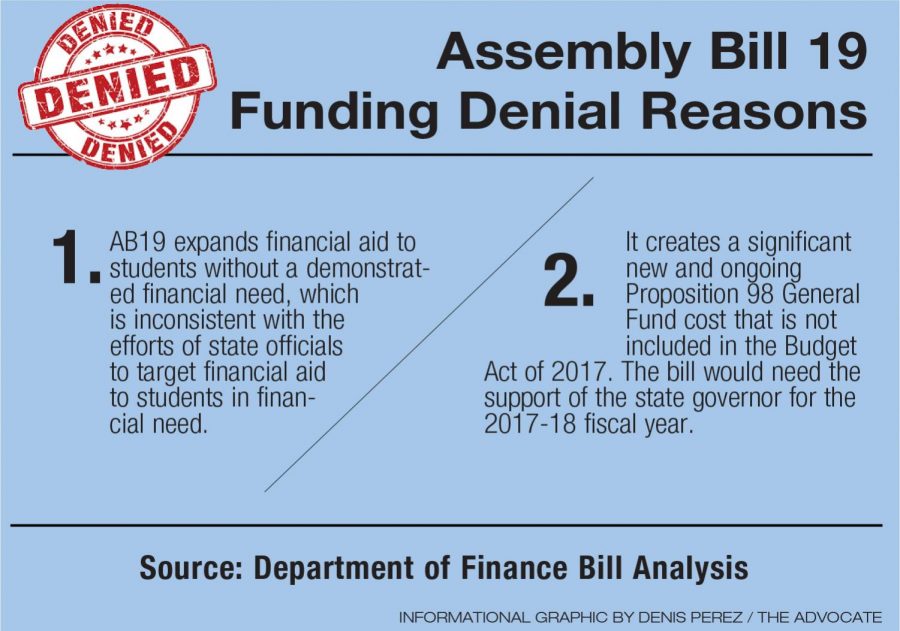Bill to remove first-year costs, offer financial assistance
Nov 15, 2017
California Community Colleges Chancellor Eloy Ortiz Oakley will ease the financial burden for first-year community college students through Assembly Bill 19 once legislation to establish funds is established.
Students are not required to provide proof of financial need to qualify for free tuition and the bill extends a tuition-free year to any individual, regardless of when they graduated high school, according to the Department of Financial Bill Analysis online statement.
AB19 “opens up the possibility” that California community colleges will offer free tuition to all full-time students attending college for the first time, according to the Newsletter of the United Faculty of the Contra Costa Community College District.
A full-time student is a student enrolled in 12 semester units or more.
The Department of Financial Bill Analysis opposed allocating funds for the bill because it expands financial aid to students without a demonstrated financial need, which is inconsistent with the effort by state officials to target financial aid to the state’s neediest students.
On Oct. 3, Governor Jerry Brown approved AB19 to waive the first year of tuition for full-time students attending a California community college.
When Brown signed AB19, known as the California College Promise, it was made as part of state law.
“The hope is that by encouraging students to begin their college experience directly after high school, that community colleges can move this new wave of students forward to either their associate degree or transfer to a four-year college,” United Faculty Executive Board member Doug Dildine said.
Assembly member Miguel Santiago, from Los Angeles, proposed AB19 to make higher education a possibility for students coming from low-income backgrounds.
Students who qualify to have their first year covered include foster youth, students with disabilities, formerly incarcerated students and undocumented students who meet the requirements of Assembly Bill 540, which allows students to pay in-state tuition of $46 per semester.
Depending on how many classes the student takes, up to $1,400 per student will be covered by the bill for community college tuition.
The California College Promise will be administered by the Chancellor of the California Community College who will distribute funding to community college districts to fund colleges that meet the requirements.
Dildine said students who come from low-income households may already qualify for Extended Opportunity Program and Services (EOPS) funds and the waiver of fees.
Dildine said AB19 will expand fee waivers to all full-time students for one year, “in which our district would include summer and the following consecutive fall and spring semesters.”
“The state is betting that the investment in first year full-time students will pay off. I’ve heard that every dollar invested in a community college student pays $4 back into the California economy,” Dildine said.
AB19 aims to increase the percentage of students earning an associate degree and career technical education certificates, as well as prepare students for in-demand jobs.
It aims to increase the transfer rate of students moving on from a community college to a California State University or the University of California system and increase the number of students who graduate from college with a baccalaureate degree.
United Faculty Executive Director Jeffrey Michels said the most important fact for now about AB19 is that it does not mean that tuition next spring or even next year will be free.
“The bill starts California down the path, but it still needs to be funded, which as I understand may take more legislation.”
Michels said as of now there isn’t anything new to communicate to students.
Many students use Free Application for Federal Student Aid (FAFSA) or Board of Governors Fee Waiver to pay for their annual tuition while in community college.
“I come from a high school with a lot of minority groups who really need the financial help,” Richmond Promise recipient Hilda Figueroa said.
Figueroa graduated from Making Waves Academy in 2016 and enrolled at Contra Costa College because her first-year tuition would be covered through the Richmond Promise Scholarship.
The program is currently providing financial support to 578 Richmond students for up to four years across 82 colleges and universities.



